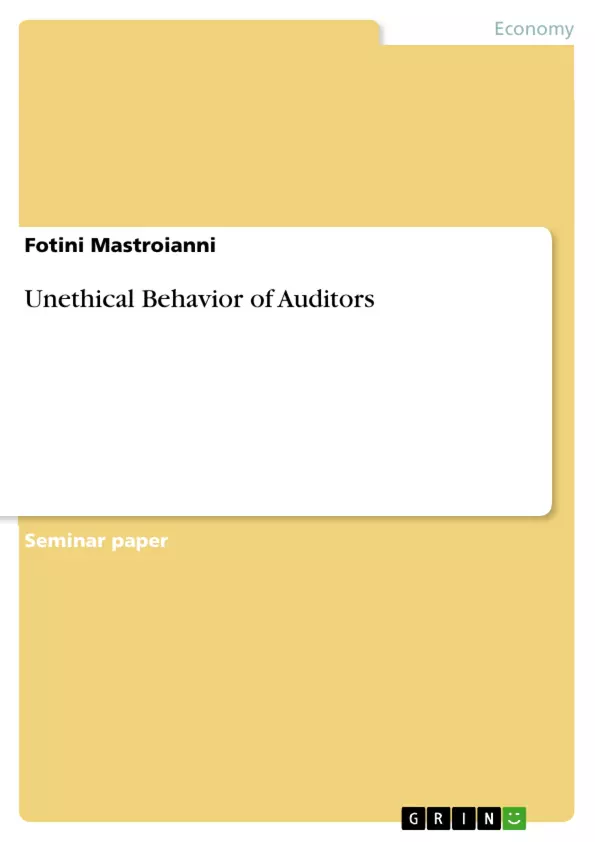The object of the current study are the challenges that auditors face and the falsification of financial reports something that occurs quite often recently. The term “falsification of financial reports” refer to the intentional change of financial data aiming at the over-evaluation of asset, sales and profits or undervaluation of expenses and damages so as to achieve the desired result. Therefore, they manage to alter the image of financial reports.
By using a representative sample of 32 companies whose stocks are negotiated at the Stock Exchange, it is sought to comprehend the phenomenon of falsification and naturally, by using the right literature.
The aspects of falsifying financial statements as well as its consequences are many and can be economic, social, political, moral, but also legal.
The role of the auditor and its behavior are crucial since there is the necessity of having moral quality which will be based on the controlling services of high quality internal control which consists the final result of the study.
Inhaltsverzeichnis (Table of Contents)
- Chapter 1 - Introduction
- 1.1 Purpose of the research
- 1.2 Importance of the research
- 1.3 Aims and objectives of the research
- 1.4 Limitations of the research
- 1.5 Background History
- 1.6 How is project arranged
- Chapter 2 - Literature Review
- 2.1 Ethics....
- 2.2 Ethics definition
- 2.3 Ethics Separation.....
- 2.4 Corporate Moral Governance...
- 2.5 Internal Audit - historical background........
- 2.6 Deontology code
- 2.7 Falsification of financial statements - definition, motivation and consequences.….….........
- 2.8 Where the phenomenon of falsification appears.
- 2.9 Methods of falsifying financial statements and direct effects........
- 2.10 Who are independent auditors and which is their job. .
- 2.11 Auditors' responsibility – Internal and external control.
- 2.12 Internal audits through the use of electronic information systems.....
- 2.13 Strong corporate culture .....
- 2.14 Rewards for right attitude and direct punishment for inappropriate behavior .
- 2.15 System of information and communication.
- 2.15.1 Information.........
- 2.15.2 Communication .
- 2.15.3 Whistleblowing
- 2.16 Internal audit committee.......
- 2.16.1 Effective operation of the Audit Committee..
- Chapter 3 – Research Methodology.
- 3.1 Research design and Data Collection.
- Chapter 4 - Data analysis
Zielsetzung und Themenschwerpunkte (Objectives and Key Themes)
The research aims to analyze the unethical behavior of auditors in Greek companies, specifically focusing on the consequences of applying International Accounting Standards. It seeks to contribute to existing literature on auditing, particularly regarding Greek companies. Key themes explored in the research include:- Ethical behavior of auditors
- Falsification of financial statements
- Consequences of applying International Accounting Standards
- Corporate governance and internal control systems
- Whistleblowing and ethical communication
Zusammenfassung der Kapitel (Chapter Summaries)
- Chapter 1 - Introduction: This chapter introduces the research topic, outlining the purpose and importance of the study. It also provides background information on the phenomenon of falsification of financial reports and the role of auditors in detecting and preventing such practices.
- Chapter 2 - Literature Review: This chapter delves into the theoretical framework of the research, exploring concepts such as ethics, corporate governance, internal control systems, and the role of auditors in maintaining financial integrity. It also examines different methods of falsifying financial statements and the consequences of such actions.
- Chapter 3 – Research Methodology: This chapter details the research design and data collection methods used in the study. It provides an overview of the research approach, sample selection, and data analysis techniques employed.
- Chapter 4 - Data Analysis: This chapter presents the findings of the research based on the analysis of collected data. It explores the patterns and trends observed regarding unethical auditor behavior, falsification practices, and the impact of International Accounting Standards on corporate governance and internal control systems.
Schlüsselwörter (Keywords)
The key concepts and themes of the research include unethical behavior, auditors, falsification, financial statements, International Accounting Standards, corporate governance, internal control, whistleblowing, and ethical communication. These keywords encapsulate the core focus areas of the study, highlighting the importance of ethical considerations within the auditing profession.- Citar trabajo
- Fotini Mastroianni (Autor), 2015, Unethical Behavior of Auditors, Múnich, GRIN Verlag, https://www.grin.com/document/358035



